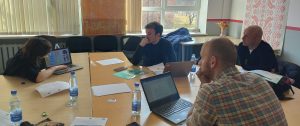
16 March, 2022
Youth represents the future of any country, and this also applies to Europe, as set out in the new Youth Strategy (2019-2027), which aims to “empower and empower European young people in European Union policy-making”. In this strategy, young people are recognized as a sector that plays a very important role in our society and faces specific and concrete challenges specific to young people. With the idea that “socio-economic exclusion and democratic exclusion go hand in hand”, the European Union is committed to a policy aimed not only at training young people to enter the labor market, but also at becoming socially and politically active citizens.
The level of NEETs in Europe (young people not working or studying) is very high (16.5% in 2018). In the face of this rather worrying situation, the needs of NEETS have been high on the European Union’s political agenda and aimed to reduce youth unemployment. Although too often young people have been blamed for this situation, in reality, it is influenced by many other factors: lack of chances and opportunity, lack of training or resources, or de-motivation of young people, for example.
At the same time, the lives of young people are closely linked to new technologies and the digital age. Likewise, art has proven to exist and change in any society in the world, and to serve as its primary mode of expression. The convergence of these two fields in digital art is still an undiscovered industry. Turning to the art discipline and not being afraid to make mistakes guarantees a promising future, especially for the young people to whom self-expression with digital media is a part of their daily habits. Arte-D project seeks to emphasize motivation, active citizenship, self-confidence and the strengthening of youth work as a driving force for improving the social inclusion of young people.
The project was in line with the priorities of the Erasmus + program and contributed to building an inclusive and cohesive community. To do this, special attention was paid to young people and youth workers to help them feel integrated into society. Expanding and developing the competencies of youth workers to promote their success in working with NEETs was a priority. The project highlighted the need to complement the knowledge of ICT tools of young people, as well as their skills with digital tools, in order to promote an inclusive environment for youth work.
Arte-D project promoted the training of youth workers in the use of new techniques and strategies in their work with NEETs to promote their social inclusion and access to employment through artistic expression in new digital formats. The project partners assessed the artistic and creative potential of young people in a context where educational trends, leisure and the work of the younger generations go hand in hand with the technological and digital revolution.
The ability and competence of youth workers to work with NEETs is enhanced through the provision of tailor-made and high-quality training in digital art. Barriers to education and employment, which are often faced by NEETs in particular, are also being reduced. The use of digital techniques and tools encourages their creativity and multiplies their artistic expression. In addition to improving their artistic and digital skills, young people are discovering the different social and cultural realities in Europe.
At the conclusion of the project, its partners from several European countries have gained vast experience in the field of youth workers. The results were achieved and are available on the project website https://arte-d.eu/resources/ An online training game for Young Digital Artists will be launched soon. The project partners look forward to widespread use of learning materials among youth workers and are inviting them to share with feedback and recommendations.